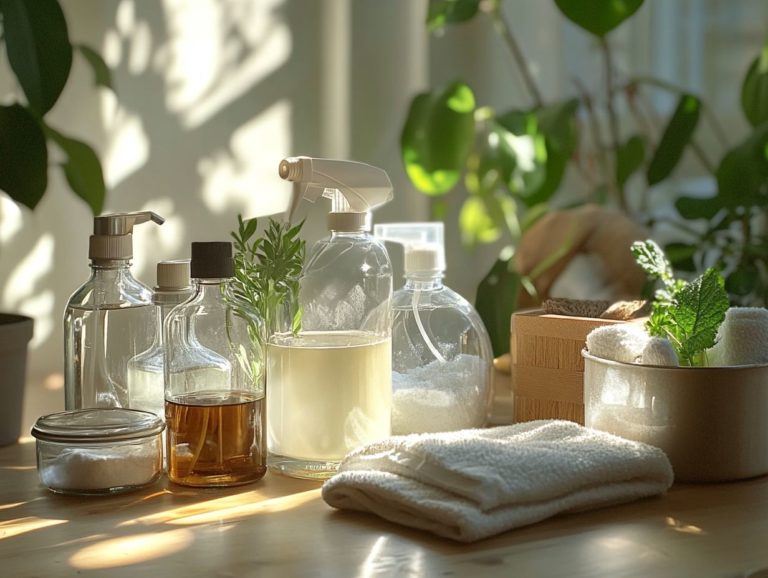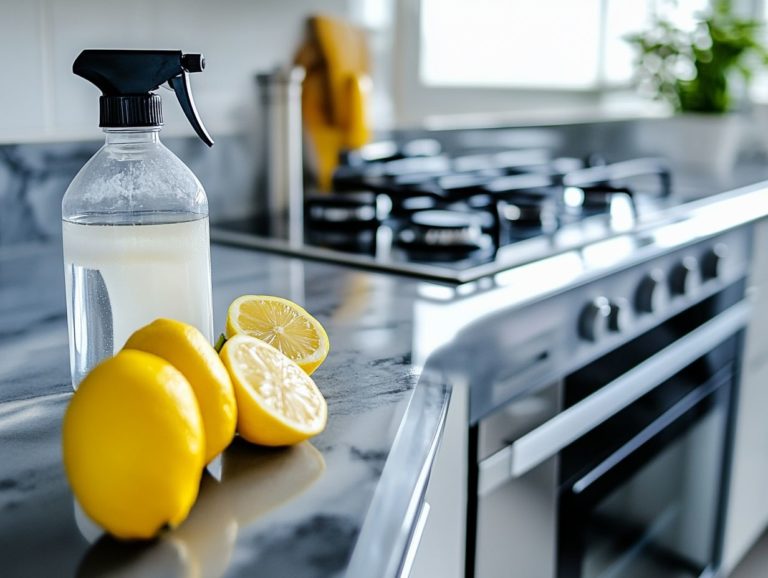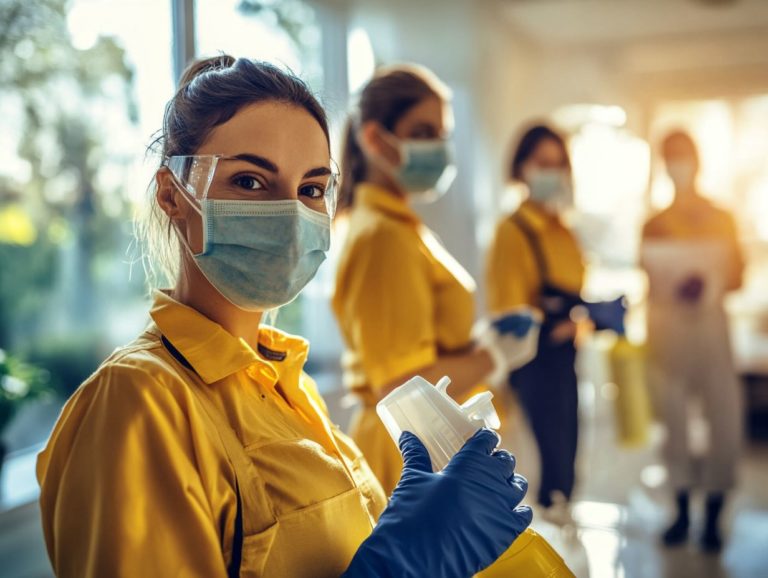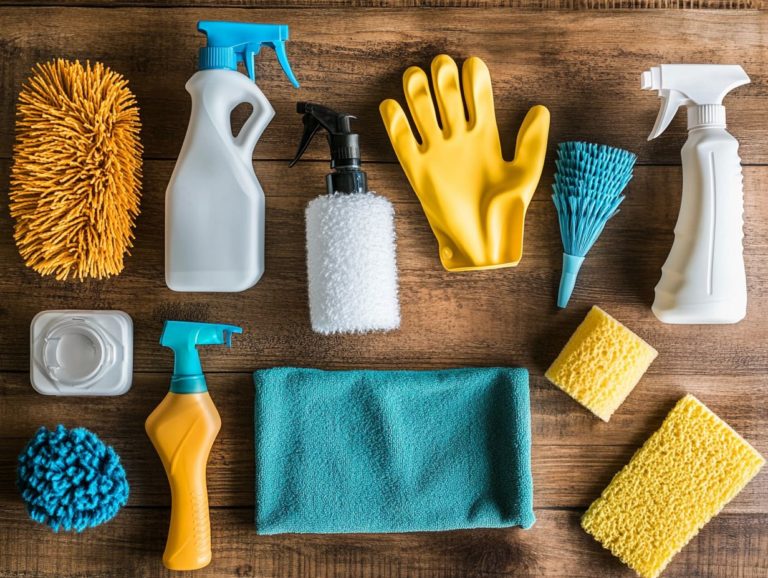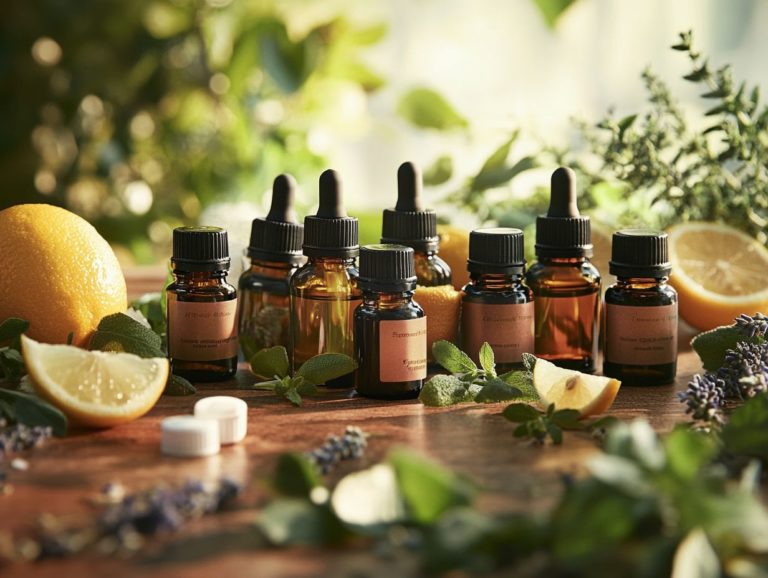Are Homemade Cleaners Effective Against Germs?
In today’s world, cleanliness and safety are more important than ever. Many people are now discovering the benefits of homemade cleaners, a stylish and eco-friendly alternative to commercial products.
But just how effective are these DIY solutions in the battle against germs and ensuring good housekeeping? This article delves into research studies that assess their efficacy against specific pathogens. It also examines the advantages of using homemade cleaners from cost savings to their positive impact on the environment and addresses potential risks that may arise. This will ensure you make informed decisions about home care.
You ll also find essential tips for using these cleaners safely and effectively, including recommendations from experts like Amanda Garrity and Carolyn Fort . Discover whether your homemade concoctions are truly up to the challenge!
Contents
- Key Takeaways:
- How Effective Are Homemade Cleaners Against Germs?
- What Are The Benefits Of Using Homemade Cleaners?
- What Are The Risks Of Using Homemade Cleaners?
- How To Properly Use Homemade Cleaners?
- Frequently Asked Questions
- Are homemade cleaners as effective as store-bought cleaners against germs?
- Which homemade cleaners are most effective against germs?
- Are homemade cleaners safe to use against germs?
- Can homemade cleaners eliminate all types of germs?
- Are homemade cleaners cheaper than store-bought cleaners?
- Do homemade cleaners have any added benefits besides killing germs?
Key Takeaways:
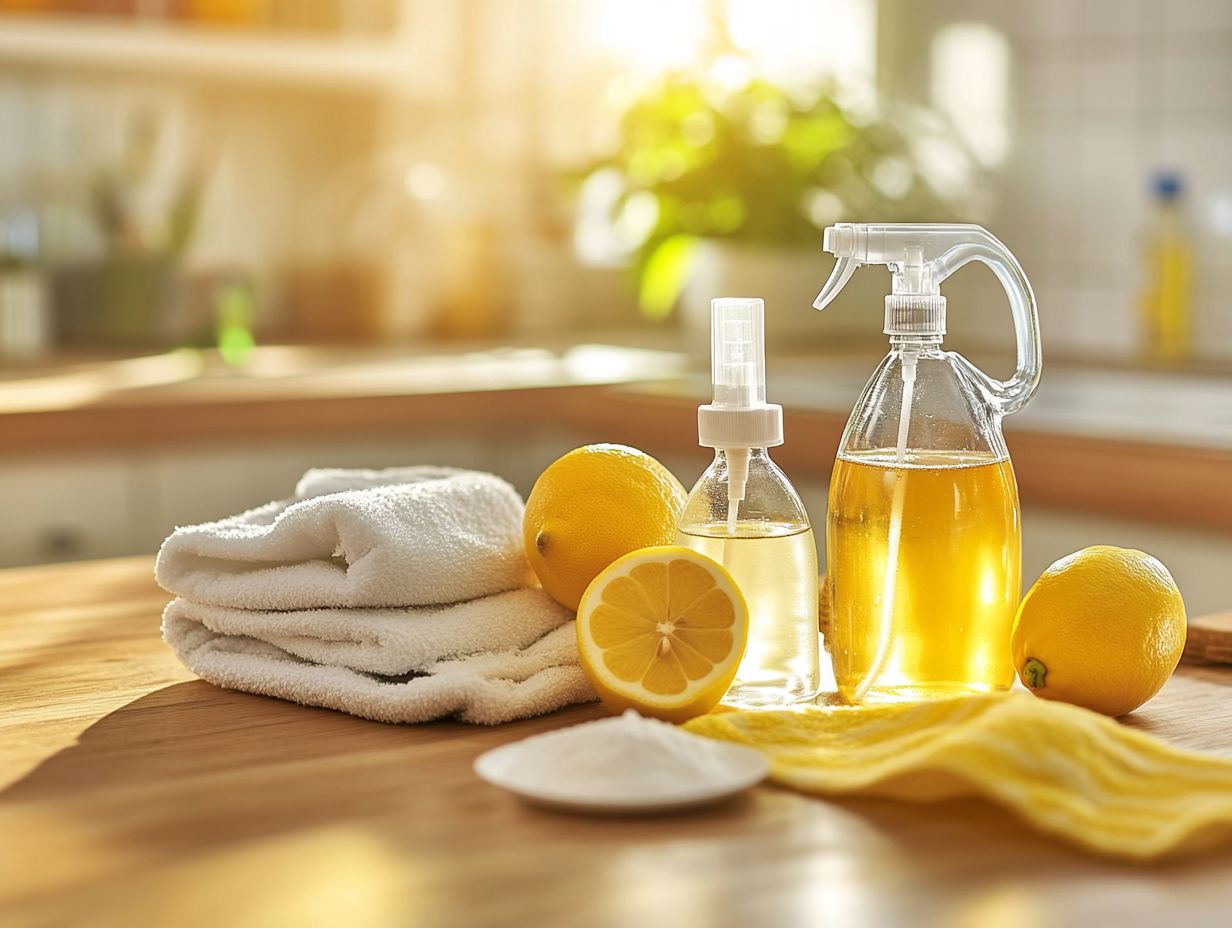
- Homemade cleaners can be effective against germs, according to research studies published by organizations such as the U.S. Environmental Protection Agency (EPA) and the American Cleaning Institute.
- Using homemade cleaners has various benefits, including being cost-effective, environmentally-friendly, and non-toxic, thanks to natural disinfectants like vinegar, lemon juice, and essential oils.
- Risks of using homemade cleaners include improper mixing and lack of disinfectant properties.
How Effective Are Homemade Cleaners Against Germs?
Homemade cleaners can be remarkably effective against germs, including bacteria and viruses, when crafted with the right natural disinfectants like vinegar, lemon juice, rubbing alcohol, baking soda, and hydrogen peroxide. Research shows these ingredients have antimicrobial properties. They can help disinfect household surfaces, making them effective disinfectants to incorporate into your cleaning routine.
However, their effectiveness can vary depending on concentration and application methods. It s crucial to compare these homemade solutions with cleaning products approved by the EPA to better gauge their efficacy and ensure safety in your cleaning routines.
1. Research Studies
Numerous research studies have delved into the effectiveness of homemade cleaners versus commercial cleaning products sanctioned by the U.S. Environmental Protection Agency (EPA), especially regarding their capability to disinfect against a range of pathogens.
These studies reveal that everyday ingredients like vinegar, baking soda, lemon juice, and hydrogen peroxide boast impressive antimicrobial properties, making them valuable allies in the fight against harmful bacteria and viruses on surfaces. For example, vinegar s acetic acid can disrupt the cellular structure of certain pathogens. Hydrogen peroxide serves as a potent oxidizing agent, effectively wiping out microbes. Lemon juice contains citric acid, which acts as a natural disinfectant.
While the results from these homemade alternatives are encouraging, you should not overlook the importance of EPA registration. This designation serves as a crucial benchmark for ensuring the safety and effectiveness of the cleaning products you choose for both your home and professional environments.
2. Effectiveness Against Specific Germs
The effectiveness of homemade cleaners can vary greatly depending on the specific germs you’re targeting. It’s important to note that while some natural disinfectants may be more powerful against bacteria, they might not hold the same efficacy against viruses.
If you’re dealing with tough bacteria like E. coli, a cleaner made with rubbing alcohol is your best bet. Its high alcohol content can disrupt the cell walls of bacteria, making it a formidable opponent in your cleaning arsenal. Using hot water can also enhance the cleaning power of these disinfectants.
While essential oils can offer some antimicrobial properties, their effectiveness against E. coli typically falls short. However, they shine when it comes to tackling viruses, including strains of influenza, thanks to their unique ability to destabilize viral structures.
Therefore, combining various ingredients can significantly amplify the disinfecting power of your homemade cleaners. This ensures a broader spectrum of germ protection for your household and creates a cleaner, safer environment.
What Are The Benefits Of Using Homemade Cleaners?
Using homemade cleaners offers many benefits. They are effective natural disinfectants.
These solutions are not only cost-effective and non-toxic but also make use of natural disinfectants like vinegar, lemon juice, and essential oils readily available in your home.
By choosing these cleaners, you reduce exposure to harmful chemicals within your household. You can enjoy strong antimicrobial properties without the harsh side effects typical of conventional chemical cleaners and without the environmental risks posed by these chemical-laden products.
As you grow more aware of your environmental footprint, opting for DIY cleaning solutions becomes a powerful statement of your commitment to sustainability and eco-friendly practices.
1. Cost-effective
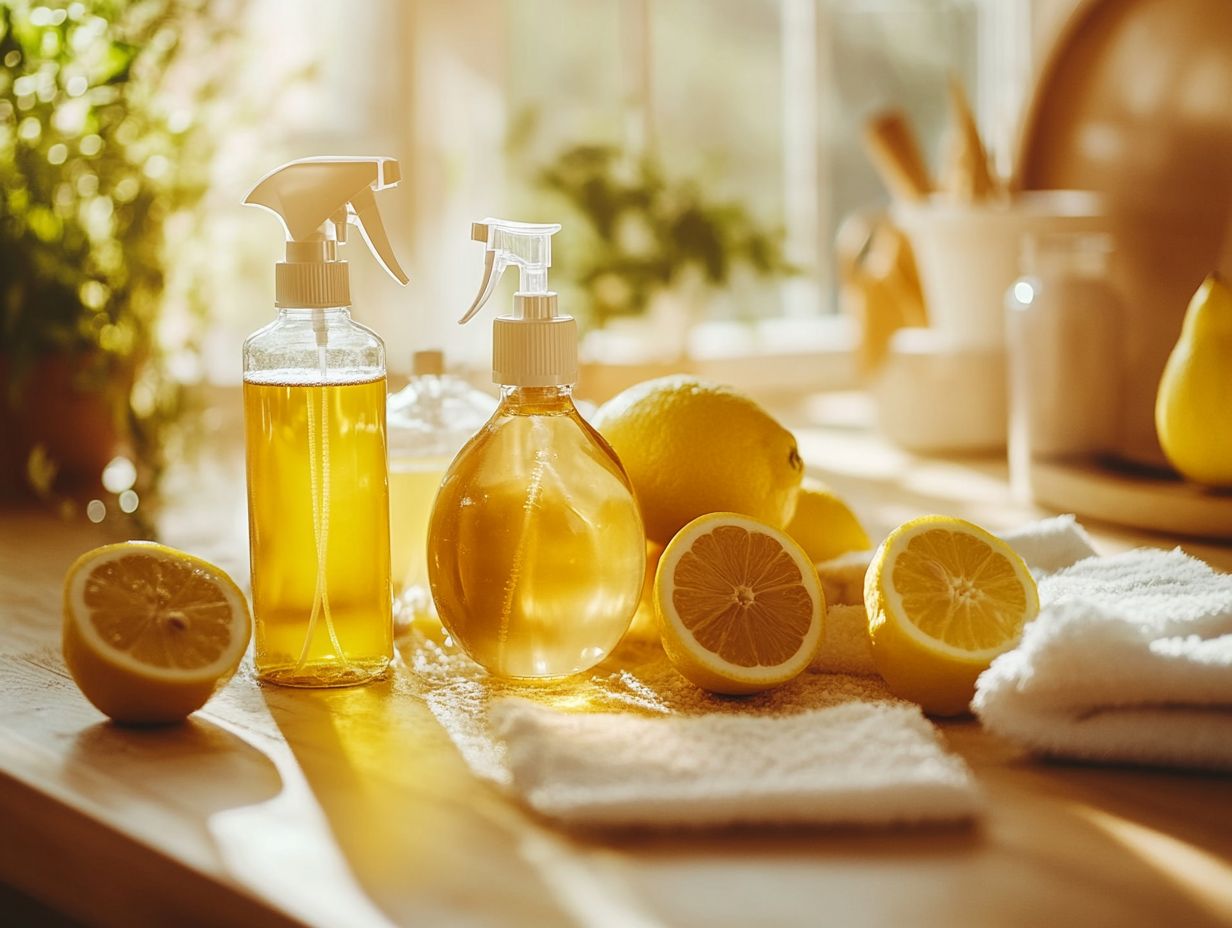
Homemade cleaners often prove to be more cost-effective than their commercial counterparts. By leveraging common household items like vinegar, baking soda, and soap and water, you can significantly cut down on expenses associated with cleaning supplies.
Choosing these DIY alternatives not only saves you money but also reduces your reliance on chemical-laden products that could pose risks to both health and the environment.
Adding ingredients like citrus peels and essential oils brings delightful fragrances and disinfecting properties into your cleaning routine, making them effective for a range of tasks.
Creating your own cleaning solutions allows you to control the strength and safety of the ingredients, ensuring they are suitable for households with children and pets.
This fantastic cost-effective approach leads to a tidier living space and promotes a more sustainable lifestyle, as many of these ingredients are biodegradable and gentler on aquatic ecosystems, such as those used by manufacturers like Seventh Generation.
2. Environmentally-friendly
Homemade cleaners are generally a more environmentally-friendly choice compared to their chemical counterparts. These natural alternatives often consist of biodegradable ingredients like vinegar, lemon juice, and essential oils, which pose significantly less risk to the ecosystem.
Research indicates that these biodegradable components effectively diminish chemical pollution, resulting in healthier air and water quality.
By choosing these alternatives, you actively minimize the release of toxic substances into the environment a common concern associated with conventional cleaning products.
A study revealed that households utilizing homemade cleaners can significantly reduce their overall environmental footprint. This shift promotes sustainability and positively impacts human health, as it lowers your exposure to harmful chemicals frequently found in commercial cleaners.
3. Non-toxic
One of the standout benefits of homemade cleaners is their non-toxic nature, enabling you to maintain a clean home environment without exposing yourself or your loved ones to harmful chemicals.
This choice leads to a safer cleaning routine free from the harshness of conventional products that often contain harmful chemicals that can worsen air quality and other dangerous toxins.
When compared to over-the-counter cleaners, which can trigger allergies or respiratory issues, non-toxic alternatives offer you peace of mind especially if you or someone in your household has sensitive skin, allergies, or pre-existing health conditions.
Using ingredients like vinegar, baking soda, and essential oils allows you to effectively tackle grime while promoting better indoor air quality, making your living spaces healthier and more inviting.
Plus, the cost-effectiveness and ease of sourcing these ingredients only add to their allure. You can take control of your cleaning choices with confidence.
Ready to start cleaning the natural way? Let s dive in!
What Are The Risks Of Using Homemade Cleaners?
While homemade cleaners can be effective, it’s important to recognize the inherent risks that come with their use. Improperly mixing ingredients can lead to unintended reactions, and some formulas may lack the necessary disinfectant properties.
Always exercise caution to ensure safety and efficacy in your cleaning practices.
1. Improper Mixing Of Ingredients
Mixing ingredients incorrectly in your homemade cleaners can result in solutions that simply don t get the job done, leaving harmful bacteria and viruses lingering on your household surfaces.
Using the wrong ratios or incompatible substances not only diminishes the effectiveness of your cleaner but can also introduce serious safety risks into your home. For instance, mixing vinegar and baking soda creates fizz, but it cancels out their cleaning power. Also, mixing bleach with vinegar produces toxic fumes, which highlights the importance of proper ingredient handling.
Many users overlook the importance of following precise recipes, which can lead to unpredictable outcomes and, in some cases, even the release of toxic fumes that affect indoor air quality.
It s essential to understand the implications associated with specific products, especially when using essential oils or other potent substances that require careful handling. This commitment ensures your cleaning routine is both safe and effective, supported by reliable sources like Good Housekeeping.
2. Lack Of Disinfectant Properties
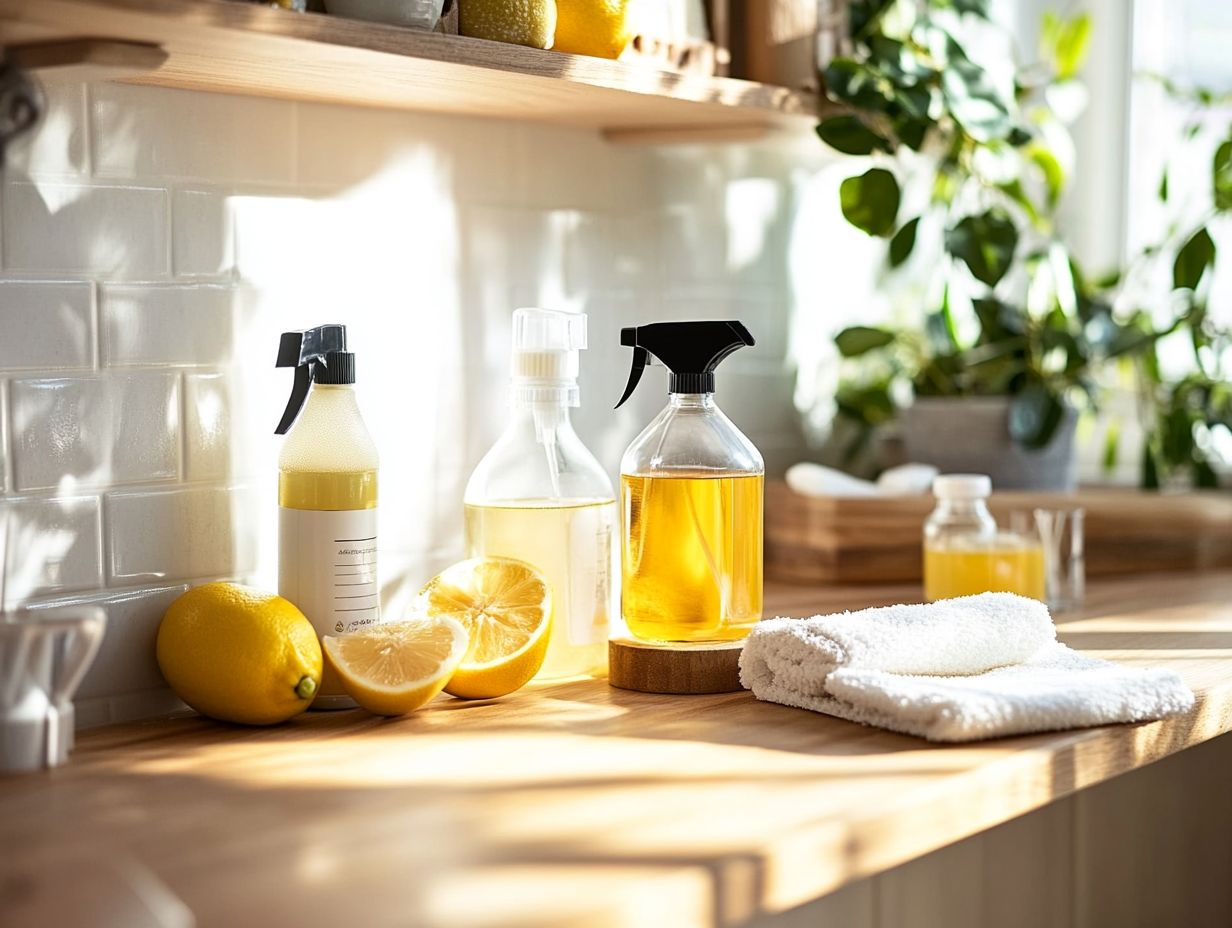
Some homemade cleaners might not have the disinfectant punch you need, which can undermine their effectiveness against certain pathogens especially if they aren t made with the right concentrations of strong cleaning agents such as natural disinfectants and hot water.
Take vinegar and baking soda, for example. While these ingredients are often praised as DIY cleaning superheroes, they haven t been proven to effectively eliminate all bacteria or viruses. In situations where a strong disinfectant is essential like flu season or in homes with immunocompromised individuals relying only on these mixtures may not keep germs at bay. This is why adding EPA-approved products and natural disinfectants to your cleaning routine is crucial.
For those times when you need something more powerful, effective natural disinfectants like hydrogen peroxide and tea tree oil can tackle even the toughest germs. You might also consider using rubbing alcohol and lemon juice as part of your germ-fighting arsenal. However, without precise formulations and adequate contact time, even these alternatives might not provide the sanitation you re aiming for, allowing harmful microorganisms to linger on surfaces.
How To Properly Use Homemade Cleaners?
To truly harness the power of homemade cleaners, it s essential to follow recipes with precision and understand how to apply these solutions to various household surfaces. This approach ensures that your cleaning efforts are both safe and remarkably effective in disinfecting your living space, maintaining good housekeeping standards.
1. Follow Recipes Carefully
When creating your own homemade cleaners, it’s crucial to stick to recipes closely to achieve the right balance of ingredients that maximizes their effectiveness as disinfectants.
Accurate measurements of components like vinegar, baking soda, and essential oils significantly impact your final product’s potency. Combining these ingredients in the correct proportions amplifies their natural abilities to combat germs and grime while ensuring their safe usage. For instance, incorporating tea tree oil, known for its antimicrobial properties, can enhance a basic vinegar solution’s performance. Additionally, adding a bit of soap and water can create a more effective cleaner for specific surfaces.
By understanding the science behind how these ingredients interact, you can craft powerful, eco-friendly cleaning alternatives that often outperform many conventional, chemical-laden products. This approach not only benefits your health but also contributes to environmental protection.
2. Test On Small Areas First
Before you dive into using homemade cleaners all over your home, it s wise to test them on small sections of your surfaces first. This simple step is essential for protecting your floors, countertops, and other surfaces from any unwanted damage or adverse reactions.
Pay close attention to how the cleaner interacts with the surface material. Look out for any signs of trouble, like color changes or damage, which could signal incompatibility. By running these small-scale tests, you can effectively evaluate both the efficacy and safety of your cleaner. Don’t forget to take note of any unpleasant odors or skin reactions during this phase; they could reveal potential issues before they escalate. This is particularly important when using chemical cleaners or disinfectants.
This smart strategy keeps your cleaning game strong and your surfaces protected!
3. Rinse Thoroughly
After using homemade cleaners, it s essential for you to rinse surfaces thoroughly to eliminate any residue that might compromise both effectiveness and safety.
Neglecting to rinse adequately can lead to the accumulation of active ingredients that not only reduce the cleaning power of your solution but could also pose health risks. For example, leftover vinegar or baking soda can alter the pH of surfaces, potentially causing corrosion, color changes, or other forms of material degradation.
In your kitchen, any lingering cleaning agent could contaminate food preparation areas, unwittingly jeopardizing food safety. Repeated exposure to these chemical residues might even trigger allergic reactions or irritations, leading to discomfort for sensitive individuals. Alternatively, using natural ingredients like the acid in vinegar and citric acid from lemon juice can be safer options.
Therefore, ensuring a proper rinse is vital for preserving the integrity of surfaces and safeguarding the well-being of everyone who uses them.
4. Store Properly
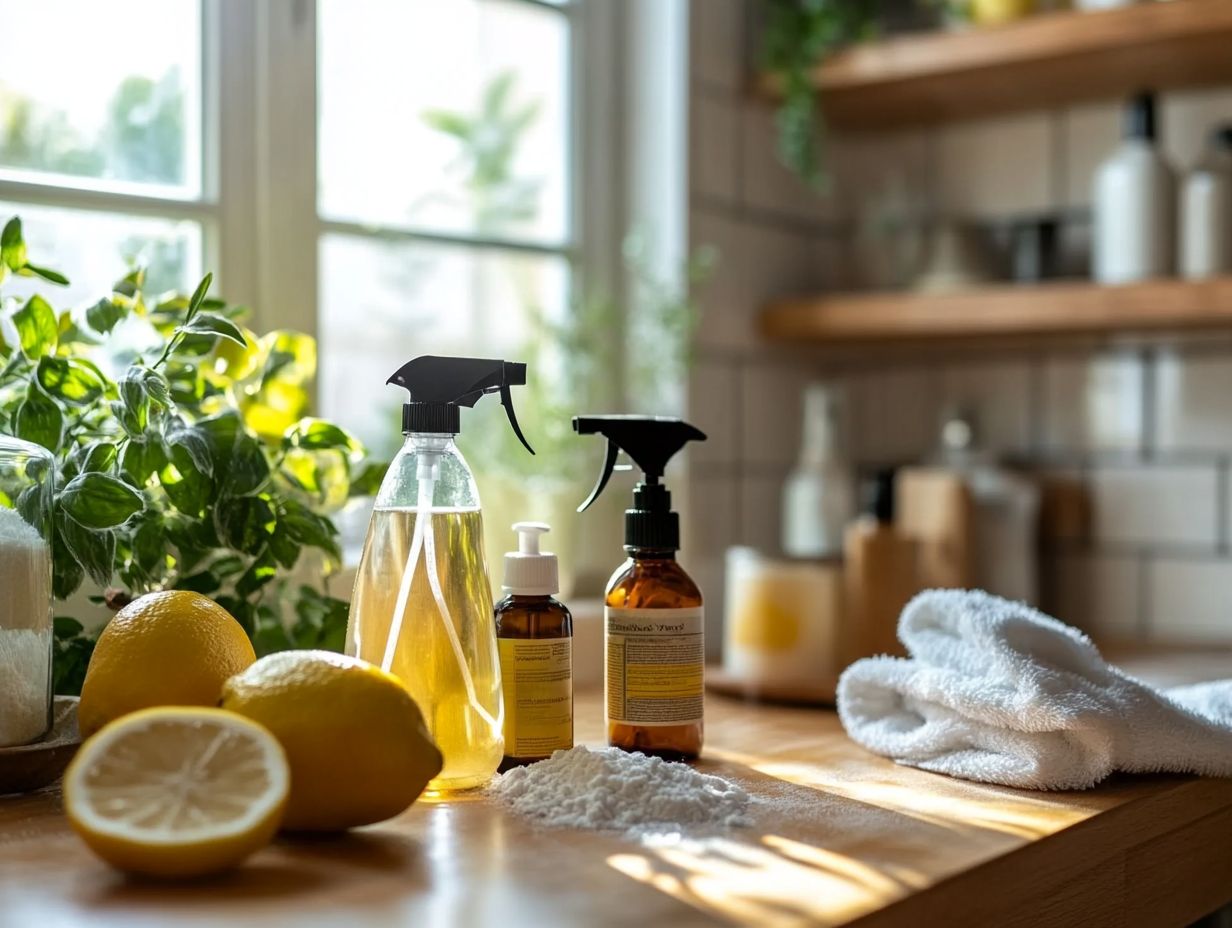
Proper storage of your homemade cleaners is crucial for maintaining their effectiveness and safety. You want to prevent the degradation of ingredients and ensure they remain potent for future use. This is endorsed by experts like Amanda Garrity and Carolyn Fort from the Good Housekeeping Institute.
To achieve this, selecting the right containers is key. Opt for airtight options that are clearly labeled; this little detail helps you quickly identify each solution and avoid any mix-ups. Glass or high-quality plastic containers are excellent choices since they’re less likely to react with the ingredients. Keep these cleaning products out of direct sunlight and in a cool, dry place to significantly extend their shelf life. Following guidelines from the American Cleaning Institute can greatly enhance the safety and longevity of your homemade solutions.
By following these best practices, you can ensure that your homemade cleaning solutions remain just as effective as they were on the day you created them, all while prioritizing safety in your household.
Frequently Asked Questions
Are homemade cleaners as effective as store-bought cleaners against germs?
According to the U.S. Environmental Protection Agency (EPA), the effectiveness can vary based on formulation and application. It depends on the ingredients used and the concentration of those ingredients in the homemade cleaner. Some homemade cleaners can be just as effective as store-bought cleaners, while others may not be as effective.
Which homemade cleaners are most effective against germs?
Homemade cleaners that contain ingredients such as vinegar, hydrogen peroxide, and essential oils are known to be effective against germs. These ingredients have natural antibacterial and antiviral properties.
Test your homemade cleaners today to ensure they work wonders without harm!
Are homemade cleaners safe to use against germs?
Homemade cleaners can be safe to use against germs, as long as the ingredients are properly diluted and used according to instructions. Always do a patch test on a small area before using a homemade cleaner on a larger surface.
Can homemade cleaners eliminate all types of germs?
Some homemade cleaners effectively eliminate certain types of germs, but they may not be effective against all types. It is important to research the ingredients and their specific effectiveness against different germs before use.
Are homemade cleaners cheaper than store-bought cleaners?
In most cases, homemade cleaners are more cost-effective than store-bought ones. Many ingredients are inexpensive and can be found in household pantries, making them a budget-friendly option.
Brands like Seventh Generation provide affordable and effective natural cleaning products.
Do homemade cleaners have any added benefits besides killing germs?
Yes, many homemade cleaners are versatile, environmentally friendly, and free of harsh chemicals. They also allow for customization with different scents and offer a sustainable option by reducing single-use plastic packaging.
The Bissell SteamShot Deluxe lets you supercharge your cleaning with homemade solutions!
Try making your own cleaners today for a healthier home!

